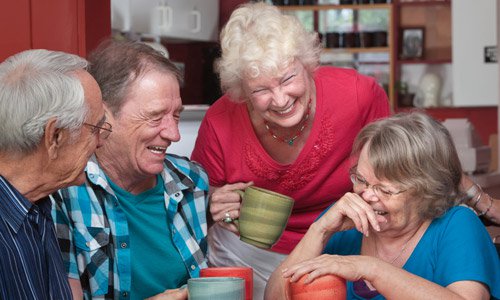How to be an effective care giver
HelpGuide.Org does a great job of breaking down the different senior housing options out there, including what they entail, and why they may be a good choice for your loved one.
Here’s what they had to say about aging in place.
Staying at home as you age has the advantage of keeping you in a familiar place where you know your neighbors and the community. You can take advantage of home care services and make home repairs or modifications to make your life easier and safer.
Aging in place may be a good option if:
- You have a close network of nearby family, friends, and neighbors
- Transportation is easily accessible, including alternate transportation to driving
- Your neighborhood is safe
- Your home can be modified to reflect your changing needs
- Home and yard maintenance is not overwhelming
- Your physical and medical needs do not require a high level of care
- You fall within the geographical confines of an integrated community, such as a “village” or NORC (Naturally Occurring Retirement Community)
On independent living.
Independent living is simply any housing arrangement designed exclusively for seniors, generally those aged 55 and over. Housing varies widely, from apartment-style living to freestanding homes. In general, the housing is friendlier to older adults, often being more compact, with easier navigation and no maintenance or yard work to worry about.
While residents live independently, most communities offer amenities, activities, and services. Since independent living facilities are aimed at older adults who need little or no assistance with activities of daily living, most do not offer medical care or nursing staff. As with regular housing, though, you can hire in-home help separately as required.
Independent living may be your best choice if:
- You see needing minor assistance with activities of daily living
- You’d like a place that does not require a lot of maintenance and upkeep
- You like the idea of socializing with peers and having activity options nearby
On assisted living.
Assisted living is a residential option for seniors who want or need help with some of the activities of daily living—things like cooking meals, getting to the bathroom in the middle of the night, keeping house, and traveling to appointments.
Assisted living facilities offer the safety and security of 24-hour support and access to care. Day or night, help is only a phone call away. However, privacy and independence are encouraged. A good facility will develop a personalized plan that meets your needs and accommodates your disabilities, while giving you the freedom to do what you can for yourself.
An assisted living facility may be a good choice if:
- You need more personal care services than are feasible at home or in an independent living retirement community
- You don’t need the round-the-clock medical care and supervision of a nursing home
On nursing homes.
Nursing homes provide what is called custodial care, including getting in and out of bed and providing assistance with feeding, bathing, and dressing. However, nursing homes differ from other senior housing facilities in that they also provide a high level of medical care. A licensed physician supervises each patient’s care and a nurse or other medical professional is almost always on the premises.
A nursing home may be a good choice if:
- Both your medical and personal care needs have become too great to handle at home or in another facility. This may be due to a recent hospitalization, or a chronic illness which has gradually been worsening.
- You need a higher level of care temporarily after a hospitalization, but it’s anticipated you will be able to return to home or another facility after a period of time.
HelpGuide.Org also emphasizes how important it is that your loved one thinks about their future needs when considering senior housing options.
When deciding on the senior housing plan that’s right for you, it’s important to consider not only the needs you have now but also those you may have in the future:
Physical and medical needs. As you age, you may need some help with physical needs, including activities of daily living. This could range from shopping, cleaning, cooking, and looking after pets to intensive help with bathing, moving around, and eating. You or a loved one may also need increasing help with medical needs. These could arise from a sudden condition, such as a heart attack or stroke, or a more gradual condition that slowly needs more and more care, such as Alzheimer’s disease.
Location and accessibility. Even if you are completely independent at this time, circumstances can change. It pays to think a little about your current location and accessibility of your current home. For example, how far is your home from shopping, medical facilities, or other services? If you can no longer drive, what kind of transportation access will you have? Can your home be easily modified? Does it have a lot of steps or a steep hill to navigate? Do you have a large yard that needs to be maintained?
Home maintenance. If you’re living alone, your current home may become too difficult or too expensive to maintain. You may have health problems that make it hard to manage tasks such as housework and yard maintenance that you once took for granted.
Social and emotional needs. As you age, your social networks may change. Friends or family may not be as close by, or neighbors may move or pass on. You may no longer be able to continue driving or have access to public transportation in order to meet up with family and friends. Or you simply may want to expose yourself to more social opportunities and avoid becoming isolated and housebound.
Financial needs. Modifying your home and long-term care can both be expensive, so balancing the care you need with where you want to live requires careful evaluation of your budget. Making a budget with anticipated expenses can help you weigh the pros and cons of your situation.
Finally, HelpGuide.Org gives tips on how best your loved one can cope with the emotions that come with a move.
It’s normal to feel confused, vulnerable, or even angry when you realize you can’t do the things you used to be able to do. You may feel guilty at the prospect of being a burden to family and friends, or yearn for the way things used to be. By acknowledging these feelings and keeping your mind open to new ways to make life easier, you’ll not only cope with your change in situation better but may also be able to prolong other aspects of your independence for longer.
Communicate your needs with family and loved ones. It’s important to communicate with family members your wishes and plans, and listen to their concerns. For example, long distance family members might think it’s better for you to move close by so that they can better coordinate your care. However, you might not want to uproot yourself from your community and friends. Similarly, just because you have family close by does not automatically mean they will be able to help with all your needs. They may also be balancing work, their own children, or other commitments. Clear communication from the outset can help avoid misunderstandings or unrealistic assumptions.
Be patient with yourself. Losses are a normal part of aging and losing your independence is not a sign of weakness. Allow yourself to feel sad or frustrated about changes in your housing situation or other aspects of your life without beating yourself up or labeling yourself a failure.
Be open to new possibilities. Your loved ones may offer suggestions about senior housing options or other ways to make your life easier. Rather than dismissing them out of hand, try to keep an open mind and discuss the possibilities. Sometimes, new experiences and situations can lead to you developing new friendship or finding new interests you’d never considered before.
Find a way of accepting help that makes you comfortable. It can be tough to strike a balance between accepting help and maintaining as much of your independence as possible. But remember that many people will feel good about helping you. If it makes it easier, offer to trade chores. For example, you can sew on buttons in exchange for some heavy lifting or cleaning chores. Or return other people’s help by “paying it forward.” Volunteer your time to help or teach others, while at the same time expanding your own social network.
For more resources on how to approach the senior housing search process, visit HelpGuide.Org.





